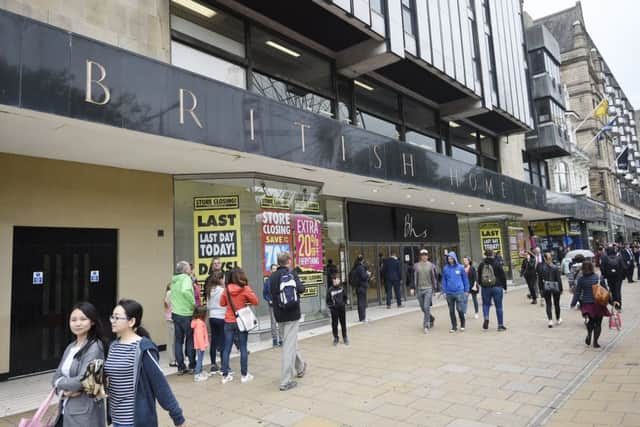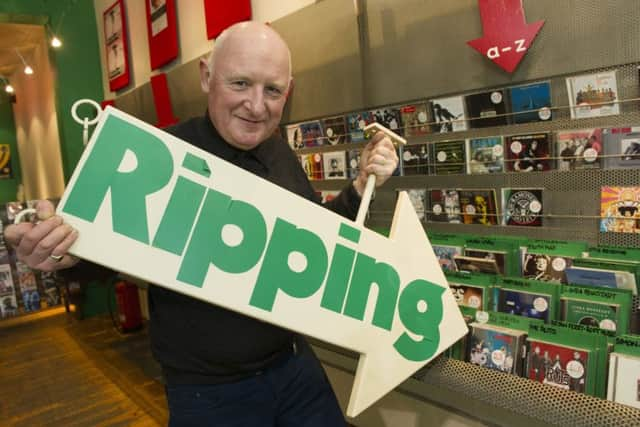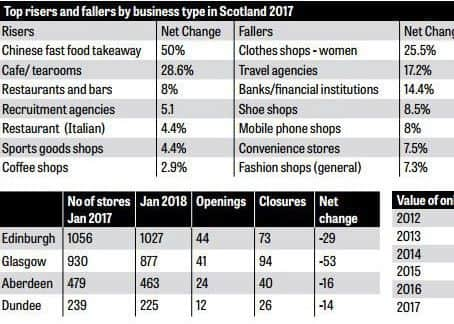73 stores closed in Capital last year but experts say Edinburgh is '˜still thriving'
and live on Freeview channel 276
There are many reasons why businesses shut – BHS was forced into administration, while Ripping owner John Richardson just decided to retire.
But behind many of the changes in the high street lie rapidly shifting trends and a dramatic switch in shopping habits. City centre shops have long had to fight off competition from out-of-town shopping centres, but now they also face the growing challenge of online retailing, combined with ever-increasing costs and an adverse economic situation.
Advertisement
Hide AdAdvertisement
Hide AdThe Scottish Retail Consortium has predicted that almost a quarter of stores could be lost over the next decade as shoppers shift to the internet.


Figures published last week show a total of 73 shops closed in the Capital last year while 44 new ones opened, a net loss of 29. But experts say Edinburgh’s retail sector is doing well compared with many other cities.
And the new St James development, due for completion in 2020, is forecast to lift the Capital up the UK shopping league table, from 13th to eighth place.
Around 28,000 people are employed in retail in Edinburgh – about 8.6 per cent of the city’s workforce.
Advertisement
Hide AdAdvertisement
Hide AdLast week’s report by accountancy firm PwC showed the number of stores in the Capital declined from 1056 to 1027 during 2017. Across Scotland as a whole there were 290 closures and 142 openings, meaning an overall reduction of 148 shops, or 4.5 per cent, higher than any other part of the UK.


The largest number of closures were among fashion shops, banks, convenience stores and travel agents. But businesses doing well included cafes, tearooms, restaurants and bars, which showed the highest increase in net store numbers in 2017.
PwC said the sectors on the rise in Edinburgh included fast food takeaways, fashion accessories, sports goods shops and Italian restaurants, while those to see the biggest decline were banks, fashion shops and convenience stores.
Roddy Smith, chief executive of Essential Edinburgh, the city centre business improvement district group, says there are few empty shops in the heart of the Capital and any vacant units are taken up quickly.
Advertisement
Hide AdAdvertisement
Hide AdHe said: “There have been a lot of key transactions in the city centre with new owners entering the market and a number of operators switching premises.


“A tougher 2018 now seems likely in the face of price inflation and cost pressures. However Edinburgh city centre continues to perform well and attract new investment.”
Mr Smith said the impact of the St James development would be “transformational”.
The project is due to have 80 shops. Some existing stores may relocate to the new centre, but most of the units are expected to be taken by retailers opening in Edinburgh for the first time.
Advertisement
Hide AdAdvertisement
Hide AdRetail expert Graham Birse believes the St James will have a “magnet effect”, bringing in new retailers, attracting more shoppers and helping to boost Princes Street and the West End too.


But he adds: “I foresee West End as more of a cafe society, restaurant/bar quarter. You can see the way George Street has evolved to have high end retail along with attractive places to eat and drink.”
But he says Edinburgh is, in any case, better placed than most other areas to sustain a healthy retail sector.
“Retailing has been very challenging for some time. Any retailer who doesn’t have an online presence alongside their high street presence is in big difficulties.
Advertisement
Hide AdAdvertisement
Hide Ad“But Edinburgh is doing well by comparison with the rest of Scotland and that’s primarily because it’s a vibrant city and a successful economy and you have significant year-round population of visitors with money in their pockets needing to eat and drink and shop.
“Many big retailers have been changing their portfolios, reducing the number of stores and increasing their online presence. A large retailer who in the past may have had 250 stores nationwide and feature in all the high streets of major towns, might now be down to 60 or 80. But as the capital city, Edinburgh is in the best position to hold onto as much retail as it can.”
Garry Clark, of the Federation of Small Businesses, says his members can be affected by the trend towards online shopping even if their own business is not one that lends itself to internet buying.


“Online is clearly a major factor in the way high streets are changing and some bigger retailers are reducing their presence on the high street,” he says.
Advertisement
Hide AdAdvertisement
Hide Ad“Some of our members, like hairdressers or coffee shops, are the kinds of business who are not subject to the same online pressures. But if the high street as a whole is suffering, with empty properties and people not going there, they suffer as well.”
He says the question is how to make local high streets and city centres more attractive.
And he argues the answer could lie in making them more diverse – not just retail, but also office space and residential – and encouraging specialist or niche shops.
“It’s interesting to look at which kind of shops are doing well – ice cream shops are growing, but booksellers are making a bit of a comeback.
Advertisement
Hide AdAdvertisement
Hide Ad“People expected book sales to be affected both by online sales and e-books. But there are areas where e-books have failed to make an impact, like non-fiction and children’s books.
“Places like Amazon may sell books at lower prices, but some booksellers have more of a niche offering, people like going into bookshops; there are ‘Meet the Author’ events and bookshops are going into schools.
“If you look at areas of the city that are doing in well retail – Stockbridge, Bruntsfield, Morningside – these are places where people live and because people are there round the clock they spend more money and there is more opportunity to anchor retail businesses there.
“People like variety, we should be encouraging businesses like independent bookshops, allowing small businesses to establish themselves and provide variety for customers.”
Advertisement
Hide AdAdvertisement
Hide AdMeanwhile, Dennis Williams, president of the Scottish Grocers Federation and who has run the Broadway Convenience Store on Oxgangs Broadway for the past 35 years, says the biggest problem for many smaller shops is the cost of keeping going.
“Everyone talks about online, but in the convenience sector the biggest thing is the cost of the business – the living wage, auto-enrolment, business rates, utility bills and bank charges.”
He says the discount supermarkets like Aldi and Lidl also take custom away from his kind of shop, adding: “Business is tough – and it’s going to get harder not easier because no-one is seeing any growth in business.”
The PwC report, however, strikes an optimistic note, predicting “continued green shoots of growth” across most sectors in 2018 as younger brands take the opportunity to pick up available property and more established businesses “tweak” their operations.